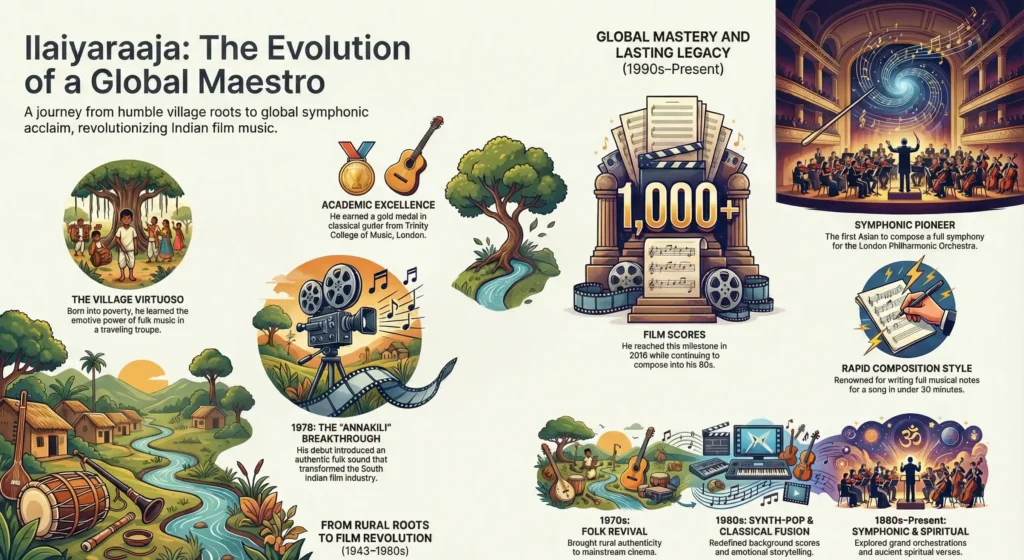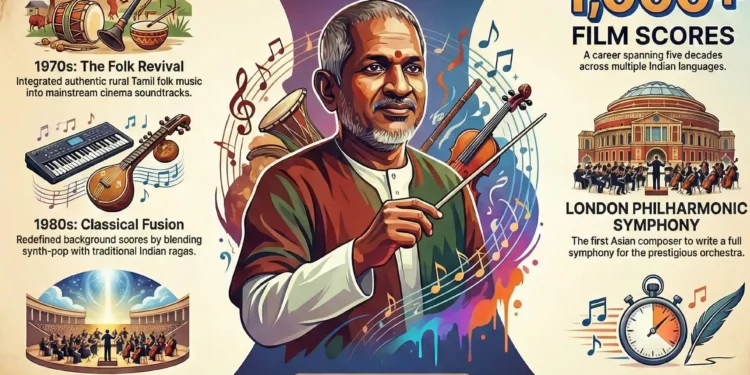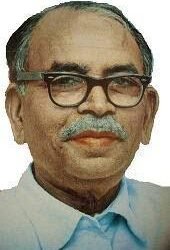Ilaiyaraaja, born R. Gnanathesikan in 1943, is an Indian musical genius who revolutionized film music by blending Western classical harmonies with traditional Tamil folk and Carnatic ragas. Rising from a humble background in rural Tamil Nadu, he debuted with Annakili (1976), bringing an authentic folk sound that took the industry by storm. With a career spanning over five decades and 1,000+ films, he is the first Asian to compose a full symphony for the London Philharmonic Orchestra. A recipient of five National Film Awards and the Padma Vibhushan, his life is a testament to the power of pure talent and perseverance.| Attribute | Details |
| Full Name | R. Gnanathesikan (Ilaiyaraaja) |
| Date of Birth | June 3, 1943 |
| Birthplace | Pannaipuram, Theni District, Tamil Nadu |
| Profession | Music Composer, Singer, Instrumentalist |
| Debut Film | Annakili (1976) |
| Key Awards | 5 National Film Awards, Padma Bhushan (2010), Padma Vibhushan (2018) |
| Spouse | Jeeva (Married until her death in 2011) |
| Children | Karthik Raja, Yuvan Shankar Raja, Bhavatharini |
| Notable Works | Sindhu Bhairavi, Saagara Sangamam, Mouna Raagam, Thalapathi, Nayagan |
Early Life: The Roots of Rhythm

Born into a Dalit family in the small village of Pannaipuram, Ilaiyaraaja’s childhood was steeped in the rustic sounds of Tamil folk music. His father, Ramasamy, and mother, Chinnathayammal, struggled with poverty, yet music remained their solace. At the age of 14, he joined his elder brother Pavalar Varadharajan’s traveling musical troupe, performing across South India. It was here, amidst the dusty roads and village gatherings, that he internalized the raw, emotive power of folk melodies. Determined to master the craft, he later moved to Madras (now Chennai) and trained under Master Dhanraj, eventually earning a gold medal in classical guitar from Trinity College of Music, London.
6 Unfoldings in the Subrahmanyan Chandrasekhar Biography
The Breakthrough: A New Sound Emerges
The 1970s Tamil cinema was dominated by established giants, but 1976 marked a paradigm shift. Ilaiyaraaja’s debut film, Annakili, introduced a fresh sound that combined rural folk authenticity with sophisticated orchestration. The song “Machchana Partheengala” became an instant anthem. To distinguish him from another composer named Rajah, producer Panchu Arunachalam gave him the prefix “Ilaiya” (Younger), and thus, Ilaiyaraaja was born.
The Maestro’s Era: Innovation & Speed
Affectionately known as “Isaignani” (Musical Genius), Ilaiyaraaja is renowned for his incredibly fast composition style, often writing full orchestral scores without a trial run.
- Fusion Pioneer: He was among the first to seamlessly blend Western classical music (counterpoints, harmonies) with Indian classical ragas.
- Pan-Indian Appeal: While a titan in Tamil cinema, his work in Telugu (Saagara Sangamam, Rudraveena), Malayalam (Pazhassi Raja), and Hindi (Sadma, Paa) garnered critical acclaim.
- Symphonic Achievement: Breaking boundaries, he became the first Asian to compose a full symphony performed by the London Philharmonic Orchestra in 1993.
7 Incredible Facts in the Satyendra Nath Bose Biography
Personal Life & Resilience
Behind the genius lies a life of profound discipline and personal loss. Ilaiyaraaja was married to Jeeva, his pillar of support, until her passing in 2011. He faced another heartbreaking tragedy in 2024 with the loss of his daughter, the National Award-winning singer Bhavatharini, to cancer. Despite these blows, he remains devoted to his art, finding spiritual solace in music and continuing to inspire his sons, Yuvan Shankar Raja and Karthik Raja, who carry forward his musical legacy.
8 Fascinating Facts in the Homi Jehangir Bhabha Biography
Quick Comparison: Evolution of a Genius
| Era | Musical Focus | Key Masterpieces | Impact |
| 1970s | Folk Revival | Annakili, 16 Vayathinile | Brought rural folk music to mainstream cinema. |
| 1980s | Synth-Pop & Classical Fusion | Sindhu Bhairavi, Mouna Raagam | Golden era; redefined background scores (BGM). |
| 1990s-Present | Symphonic & Spiritual | Thiruvasagam, Pazhassi Raja | Exploring spiritual themes and grand orchestration. |
Curious Indian Fast Facts
- The Gold Medalist: He holds a gold medal in classical guitar from Trinity College of Music, London, a rare feat for an Indian film composer at the time.
- Speed Writer: He is known to write the musical notes for an entire song in less than 30 minutes, directly on to the score sheet.
- The 1000th Film: His 1000th film score was for the movie Tharai Thappattai (2016), directed by Bala.
- Not Just Films: He composed “Thiruvasagam in Symphony,” an oratorio of ancient Tamil verses, performed by the Budapest Symphony Orchestra.
- Inventor: He invented a new Carnatic raga named “Panchamukhi.”
Conclusion
Ilaiyaraaja’s story is one of breaking barriers—social, economic, and musical. From a boy who couldn’t afford a radio to a maestro honoured with the Padma Vibhushan, his life proves that true art transcends all boundaries. His music doesn’t just entertain; it heals, evokes, and connects millions of souls. As he continues to compose well into his 80s, Ilaiyaraaja remains a living legend, reminding us that music is not just sound, but a divine conversation.
8 Remarkable Secrets in the Jagadish Chandra Bose Biography
If you think you have remembered everything about this topic take this QUIZ
Results
#1. What was Ilaiyaraaja’s debut film in 1976 that introduced a fresh folk sound to Tamil cinema?
#2. Ilaiyaraaja holds a gold medal from Trinity College of Music, London, in which instrument?
#3. Who gave Ilaiyaraaja the prefix “Ilaiya” (Younger) to distinguish him from another composer?
#4. Ilaiyaraaja was the first Asian to compose a full symphony performed by which prestigious orchestra?
#5. What is the name of the new Carnatic raga invented by Ilaiyaraaja?
#6. Which film marked Ilaiyaraaja’s 1000th film score?
#7. Ilaiyaraaja composed “Thiruvasagam in Symphony,” an oratorio of ancient verses in which language?
#8. In 2018, Ilaiyaraaja was honored with which high civilian award by the Government of India?
What is Ilaiyaraaja’s real name?
His birth name is R. Gnanathesikan. He was renamed Ilaiyaraaja for his debut film.
How many films has Ilaiyaraaja composed for?
He has composed music for over 1,000 feature films in various languages.
What is unique about Ilaiyaraaja’s music?
He is celebrated for fusing Western classical orchestration with traditional Indian folk and Carnatic music, creating a unique, rich soundscape.
Has Ilaiyaraaja won international awards?
While primarily recognized in India, his composition Thiruvasagam in Symphony is globally acclaimed, and he was the first Asian to score for the London Philharmonic Orchestra.
Who are Ilaiyaraaja’s children?
His children are music composers Karthik Raja and Yuvan Shankar Raja, and the late playback singer Bhavatharini.
Read More: https://curiousindian.in/a-r-rahman-january-1967-present/








